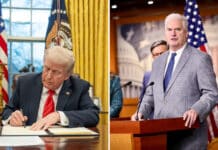WASHINGTON DC- Minnesota Representative Erik Paulsen is leading the way on crafting a bill to protect Deferred Action for Childhood Arrivals (DACA) recipients.
Since the start, there have been questions about the constitutionality of DACA due to Article 2 of the Constitution not explicitly granting the President the powers of naturalization. However, subsequent laws such as the Immigration and National Security Act has been argued to give the President that power.
Regardless, on September 5, 2017 President Trump announced that the program was going to be dismantled. During the 2016 election, Trump referred to DACA as ‘illegal amnesty.’ However, President Trump’s repeal had one caveat.
“For all of those (DACA) that are concerned about your status during the 6 month period, you have nothing to worry about,” Trump said in a Tweet, “No action!”
Since September various members of Congress have taken up several types of legislation in order to codify protections for those brought here illegally as children. Paulsen’s legislation is one of the latest.
“Making sure, in that process, they are going to have legal status, they will be contributors to the economy and they are going to move forward themselves and their families,” said Paulsen, “without having fear they are going to return to a country they have not known before.”
Paulsen’s legislation will provide 5 more years worth of protection to those enrolled into certain programs such as higher education, joining the military, or getting a job. The idea is that it would give these people more time to enroll for full citizenship.
“Our broken immigration system needs to be fixed, because it’s harming our economy and locking out the next generation of innovators,” Congressman Paulsen said in press release following President Trump’s announcement, “This includes ensuring that young people who came to the United States through no fault of their own and have done nothing wrong are able to be valuable contributors to our country.”
Members of the Minnesota Congressional delegation have been unclear on their stance on how they are going to proceed on DACA.
“It’s important that we debate comprehensive solutions in the next six months,” Congressman Jason Lewis, “and I look forward to working with my colleagues in Congress to address the final status of DACA enrollees.”
“This is an immensely complex issue and I fully support the opportunity for our nation’s lawmakers to gather public input,” said Congressman Tom Emmer.
Paulsen hopes to have a bill on the President’s desk by the beginning of the new year.











